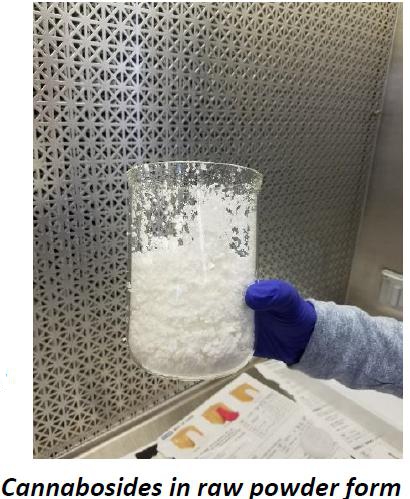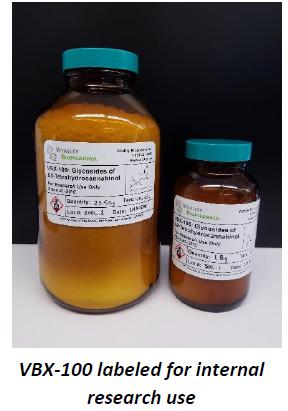Attached files
| file | filename |
|---|---|
| EX-20.1 - Vitality Biopharma, Inc. | ex20-1.htm |
| EX-19.2 - Vitality Biopharma, Inc. | ex19-2.htm |
| 8-K - Vitality Biopharma, Inc. | form8-k.htm |
Exhibit 19.1

To the Shareholders of Vitality Biopharma, Inc.:
I wrote to you less than two years ago describing our discovery that a Stevia plant enzyme could be used to create a new class of cannabinoid compounds. We quickly recognized the value, seeing that these novel molecules, known as cannabosides, might enable targeted delivery and provide therapeutic effects without any psychoactivity. We’ve gone on to confirm this potential within numerous preclinical studies, and we’re now on the verge of approval for our first-in-man clinical trials to be conducted here in the U.S.
So, we expect 2018 will be a momentous year, and I’d like to now recap with you some key aspects of our program and the work we’ve completed so far.
Potential for Expedited Regulatory Development and FDA Approvals
Cannabosides are considered prodrugs, which means that these compounds enable the targeted release of cannabinoids like THC at specific locations within the body. This also enables us to take advantage of the fact that THC has been approved as a pharmaceutical in the U.S. since 1986 (in pill form known as Marinol or dronabinol). Because of this, there is a tremendous amount of safety data already available on file at the FDA. We’re uncertain today exactly how much advantage this will provide us, but it’s possible that it could dramatically reduce the cost and time required for FDA approval.
In certain diseases, such as inflammatory bowel disease (IBD), beyond the established safety data for THC, there is compelling independent data suggesting it will have significant therapeutic benefits. Specifically, independent trials have shown THC that can induce remission of IBD, even in drug-resistant patients where no other FDA-approved medications have previously worked. Separate trial work has established that THC may provide a safe alternative to steroids or opiate painkillers. These existing studies and scientific publications act as a roadmap for us, pointing us towards conditions where our compounds may have profound benefits for patients, and where we could readily achieve success within Phase 2 clinical trials.
Cannabinoid Biosynthesis and Production Breakthroughs
The discovery of cannabosides was based on a proprietary biosynthesis process, but in terms of bioprocessing R&D, we haven’t stopped there. We built new on-site capabilities to achieve DEA approval of our research site, and we have focused our operations on development of cannabinoid pharmaceuticals. We continue to maintain compliance with DEA requirements, as well as with the requirements of California’s Research Advisory Panel, an arm of the California Department of Justice.
Our bioprocess (utilizing enzymatic glycosylation) was originally developed several years ago for stevia, and we continue to adapt it and gain new efficiencies. Late last year, we reported on a more than 15-fold improvement in biocatalyst production and the acquisition of new tools to help ensure adherence to pharma-grade GMP requirements. Our R&D team has now implemented a semi-continuous production system that makes biosynthesis of cannabosides far more scalable and manageable than ever before.
With our DEA approval and these process improvements, we are confident in our ability to manufacture on-site and supply whatever quantity of drug material is desirable for the conduct of multiple Phase 2 clinical studies. Built from the ground up, the facilities and equipment we have put in place are well suited to our needs at this stage of development. We have also assembled a strong scientific team, which is capable of managing these operations and much more. We expect to report on many additional bioprocessing innovations in the months and years ahead.
Vitality Biopharma, Inc.
1901 Avenue of the Stars, 2nd Floor
Los Angeles, CA 90067
Introducing the VBX Class of Drug Formulations, and Vitality’s Lead Drug Candidate VBX-100, a THC Prodrug

We have filed for intellectual property coverage of nearly 200 unique compounds, which are glycosylated forms of THC, CBD, CBDV, endocannabinoids, vanilloids, and more. These were introduced to the world in significant technical detail through a bioRxiv paper released in January 2017 and titled, “Cannabinoid glycosides: In vitro production of a new class of cannabinoids with improved physicochemical properties.” Each of the individual compounds have been given VB designations, such as VB304 or VB110, which are two that were described in our bioRxiv paper and patent literature.
Our drug formulations today all contain one or more of these individual cannabinoid glycoside compounds, as well as other ingredients, such as bulking agents. This enables cannabosides to then be easily filled into capsules, providing maximal convenience for patients. Going forward, each of our drug formulations will be given a separate VBX designation, meaning that our lead drug candidate, a THC prodrug, will now be known as VBX-100.
 As
is common in early-stage drug development, teams evaluate (and some agonize over) which of their “babies” perform
better, and which drug compounds should be the first to advance into clinical trials. Many cannabinoids have therapeutic potential
beyond just THC and CBD, so there are many options for us, but we ultimately decided to establish our lead drug candidate VBX-100
as a THC prodrug.
As
is common in early-stage drug development, teams evaluate (and some agonize over) which of their “babies” perform
better, and which drug compounds should be the first to advance into clinical trials. Many cannabinoids have therapeutic potential
beyond just THC and CBD, so there are many options for us, but we ultimately decided to establish our lead drug candidate VBX-100
as a THC prodrug.
With independent clinical trial data already demonstrating that systemic THC can provide therapeutic benefits in treating drug-resistant IBD (Crohn’s disease and ulcerative colitis), and an expedited path towards approval available to us given THC’s history of pharmaceutical use in the U.S., it wasn’t a difficult decision. A THC glycoside prodrug also has obvious appeal because it avoids drug psychoactivity. It will be exciting to see how potent VBX-100 can be in the clinic, and the speed at which we’re able to progress it through trials.
Positive Preclinical Results, and New Therapeutic Uses for Cannabinoids
For VBX-100, we have already obtained positive preclinical results for treatment of colitis, including results that indicate treatment with a gut-targeted THC prodrug will provide far more than symptomatic relief. So, there is a clear need and ethical rationale based upon this data for us to initiate trials as soon as possible.
We have also been exploring additional therapeutic uses of cannabinoids, including conducting preclinical studies that suggest cannabinoids can have profound anti-cancer and anti-microbial effects. Results we obtained in 2017 demonstrated in vitro therapeutic activity for cannabinoids where they induced death of cell lines and prevented growth of both colorectal cancer and also C. difficile, a “superbug” that colonizes the large intestine and is often lethal in elderly patients. These two conditions alone are responsible for tens of thousands of deaths in the U.S. annually, and given that they involve the large intestine, cannabosides clearly have potential to target and treat both of them.
Staying Proactive on Regulatory Matters, and Focusing on Value
We remain one of relatively few companies that have obtained DEA approval to develop cannabinoid pharmaceuticals within the U.S., and this positions us to operate with stability for many years to come. Given the potential for an increase in federal drug enforcement, the path we chose appears to be a prudent one. Along similar lines, we continue to be proactive on regulatory matters, seeking to position ourselves for long-term success. We recently corresponded with the DOJ on behalf of a U.S.-based supplier to inform them about the importance of increasing the supply of federally-approved cannabinoids. This would likely reduce costs and simplify logistics for us long-term, and our letter also provided an opportunity to inform government officials about emerging data showing how powerful cannabinoids could be as an alternative to opioids, with potential to help millions of American safely wean or taper off the use of narcotic painkillers. We also have been proactive with the FDA by providing public comment on proposed changes to its orphan disease program. We described how pediatric research may be affected, and requested additional guidance on how innovative pediatric therapies like VBX-100 could gain expedited FDA approval through entry into its Breakthrough Therapy, Fast Track, or Accelerated Approval programs.
Regardless of the outcome of individual regulatory matters, we’ll keep building upon our team’s R&D strengths, and stay focused on delivering significant value. If we continue to deliver, for example, through dramatically improving the standard-of-care for patients, or through another unexpected R&D discovery, a regulatory change here or there shouldn’t hardly affect us at all.
As we prepare for initial clinical trials aimed at treatment of IBD, IBS, and use of cannabinoids as an alternative to opiates, we’re also building a growing team of clinical staff and outside advisers. This includes individuals like Dr. Caroline McCallum and Dr. Alasdair Barr from the Univ. of British Columbia, Dr. David Ziring from Cedars-Sinai in Los Angeles, Dr. Mark Gerich from the Univ. of Colorado, Dr. Doug Drossman from the Rome Foundation, and many more. We hope to foster and build upon these relationships in the near future, mainly through research collaborations that are exciting for us and impactful for patients.
We’re also thrilled that many patients and advocates in the IBD community are already aware of us, and that they’re eager to enroll or be involved in our upcoming studies. We’ll be in touch with everyone soon.
Finally, thank you to our shareholders for your ongoing interest and support. It’s always a pleasure to hear from you, so please don’t hesitate to keep in touch.
Best regards,
Robert Brooke
CEO, Co-founder
